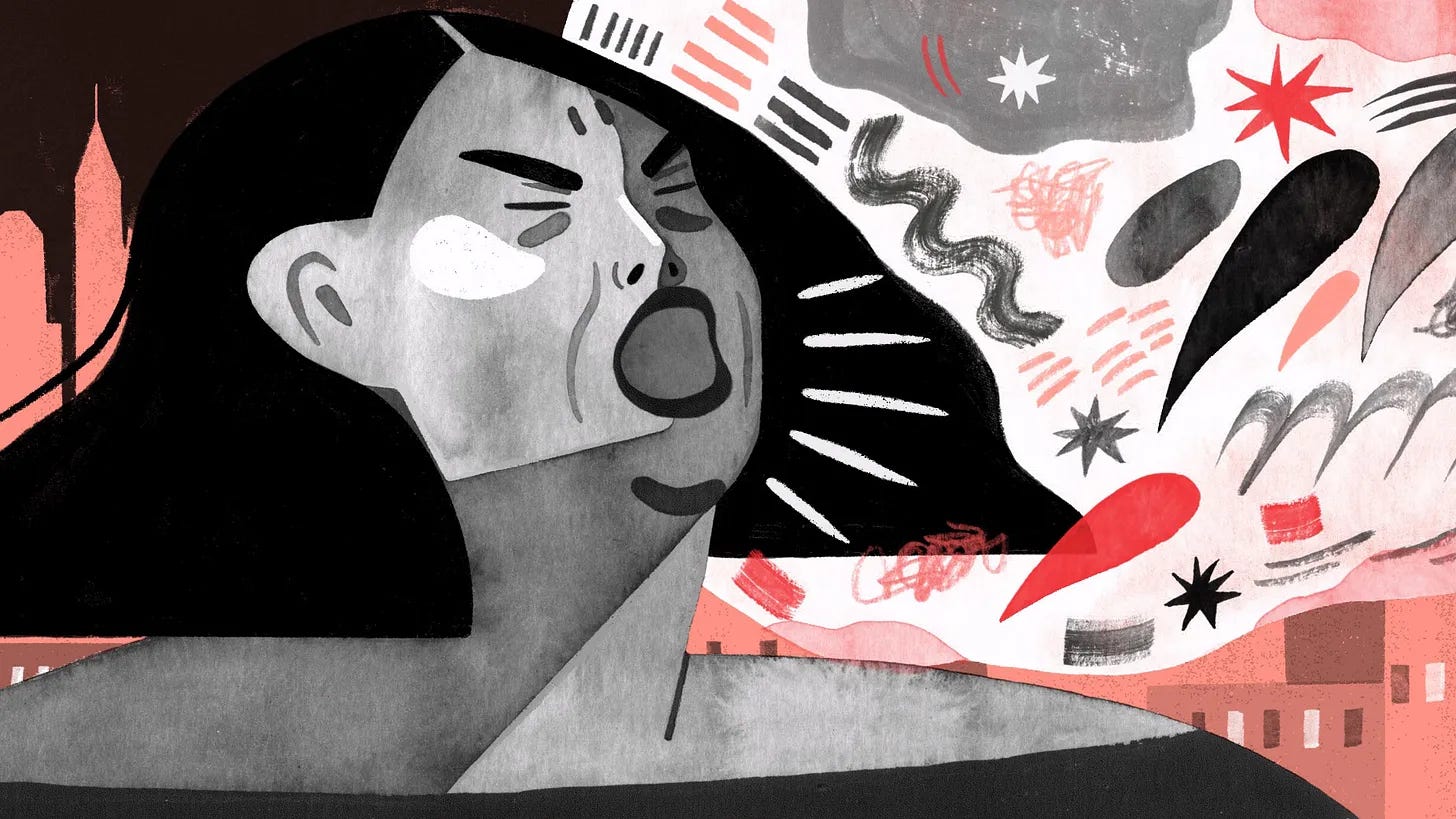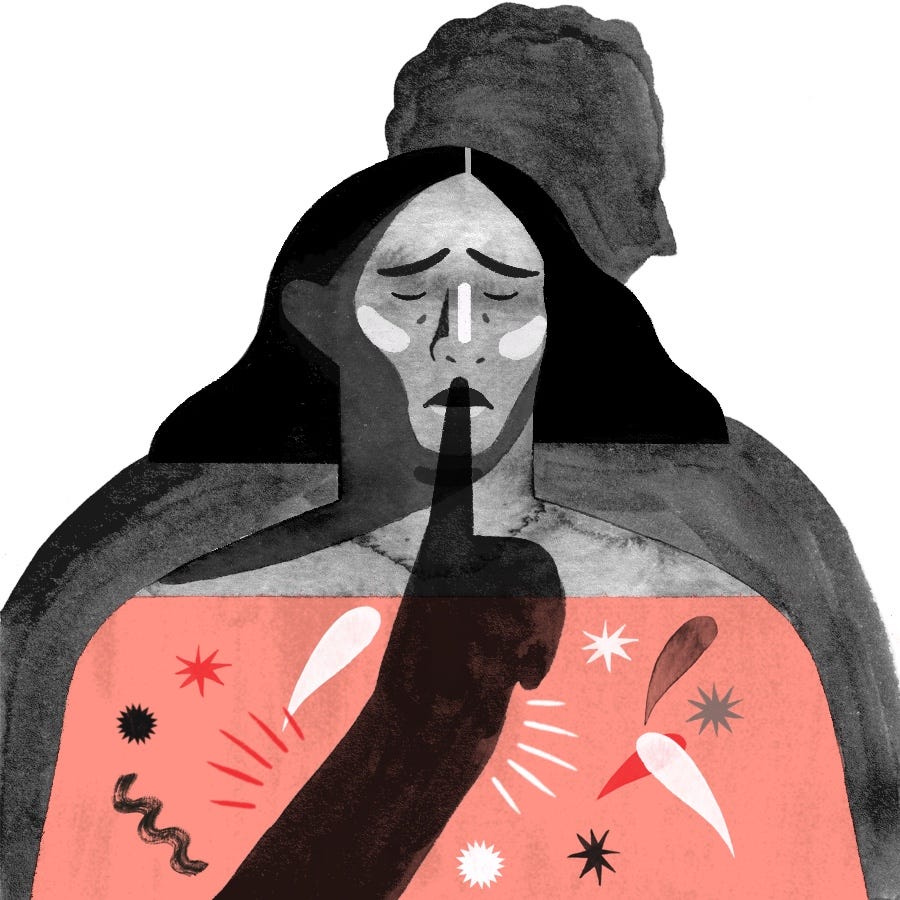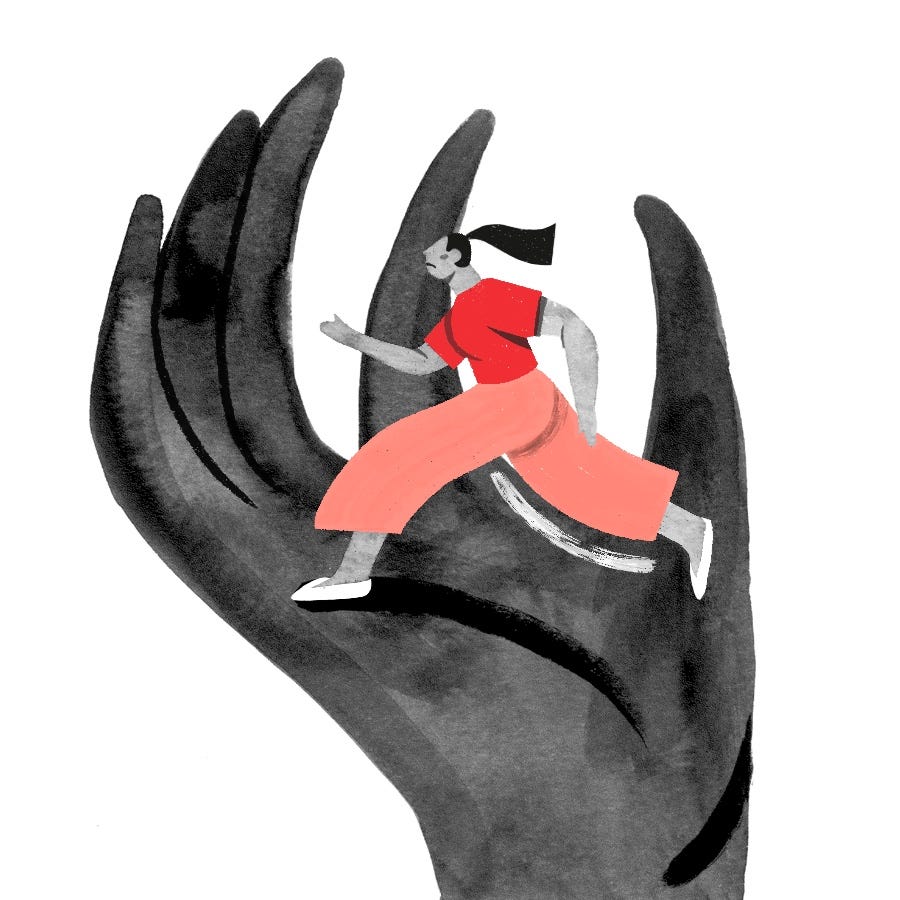My Father Scared Me Speechless. Here’s How I Got My Voice Back.
After years of terror and abuse, the simple act of speaking paralyzed me with fear. Now I will never be silent again.
I must have been 5 or 6 years old when Jessica, a girl from my elementary school who lived across the street, invited me to hang out with her and a group of other neighborhood children. My mom said I could go, but she adamantly made me promise not to ride my bike in the street, which we’d seen the other children doing for much of the afternoon. I could ride in Jessica’s large driveway, but no farther. I promised her I wouldn’t ride in the street, and I meant it. But then, 15 minutes later, when Jessica said everyone was going bike riding again, I panicked.
I tried to tell her that my mom had told me not to ride in the street, but the words would not come out. I stood still as Jessica and her friends marched toward their bikes. Maybe they’d forget about me and ride off without me. I could wait on the lawn until they came back and keep my promise to my mom.
But Jessica noticed I wasn’t following her and beckoned to me. With each deliberately slow step toward her, my brain screamed, “Just tell her: I — can’t — ride — in — the — street. I’m — not — allowed — to — ride — in — the — street. My mom said I can’t. Just — say the words!”
But the connection between my brain and voice was backfiring. As my heart raced, I moved my lips, begging the words to emerge, but they wouldn’t. It was as if I were being strangled.
Suddenly, I found myself riding my bike toward Jessica — in the street — trying to catch up so that I could tell her once and for all that I wasn’t allowed to do what I was already doing. It felt like I was riding through Jell-O. I could see her but couldn’t reach her, and my voice was still entirely absent.
It wasn’t the first time something like this had happened. You know those nightmares where you try to scream but nothing comes out? When I was a child, that nightmare was my life. I wasn’t just “shy,” as my teachers said. My sadistic, abusive father turned the simple act of speaking up — about anything at all — into my most paralyzing fear.
A year or so later, at a women’s shelter my mom had fled to with my sister and me, a counselor made it her mission to get me to scream. I was holding way too much inside, she said, as she led me up a hidden staircase in the shelter. Perhaps it was just a fire escape, but in my mind, it was reminiscent of a Nancy Drew–style secret passageway, accessible only with the counselor’s key code (as many of the doors in the shelter were) and entirely private. I remember making our way to a door that led onto the roof. The door was open, and all I could see was a black void as I remained glued to the staircase steps.
The counselor told me that from the roof I could scream as loudly as I wanted, and it wouldn’t disturb the peace — that none of the shelter residents would hear and neither would anyone lingering outside, because we were so high up. I would just be screaming out into the darkness, so I was told to hold nothing back.
It seemed impossible. My father’s mind-warping abuse had cost me the ability to voice any of my thoughts aloud, even answers to simple questions like, “What’s your favorite music?” or “What’s your favorite fruit?” To speak was to invite gaslighting or taunting — like being told an apple wasn’t really a fruit, or that I couldn’t possibly like someone as ridiculous as Barbra Streisand.
My father used my words against me. If I said the carpet was green, he would berate me until I said it was blue — then mock me for calling it blue when it was obviously green. He would repeat this exercise about everything, big or small, until he had convinced me that I was wrong. Even about how I felt about him.
The man who gave me night terrors by telling me stories about how my beloved grandma was going to hell, who screamed at me when I fell and cut my knees, and who lit up like a haunted Christmas tree the first time I ever put my hand on my hip to defy him, was a gifted actor.
Later, when I expressed disdain about being legally forced to visit him, he told an Oscar-worthy sob story about how when I was a toddler, I accidentally poked him in the eye with a stick. I almost blinded him, he said, eyes brimming with tears. Had I been in my right mind, outside of my father’s spell, I would have wished with all my might that I had indeed blinded him and taken away some of his power (if there was any truth to his story to begin with). But in that moment, I pretended I had to go to the bathroom so I could bawl in private about what a horrible person I’d been to my poor, poor dad. His ability to manipulate and twist my words to punish me was masterful. I soon realized it was safer to say nothing at all.
The counselor at the shelter kept assuring me that we were in a soundproof space, that there would be no repercussions for discovering how loud my voice could be. But just like the time I was riding my bike toward Jessica, desperate to hear my own voice outside my head, nothing came out. I had grown too accustomed to my father taking perverse pleasure in my fear, too accustomed to trying to hide it. Which meant absolutely no screaming.
I remember one heart-stopping car ride at the end of a court-ordered visit with my father. He insisted he was taking me back to my mom, but hours after I was legally required to be home, we were still driving — in the wrong direction.
I didn’t want to let him win, so I went to great lengths to pretend he wasn’t making me uncomfortable, wasn’t making me clench every muscle in my body in terror. And even as I acted my heart out, I knew he knew I was pretending, and that it gave him even more depraved satisfaction.
Every time he promised to take me home and eventually changed course so that we were finally heading the right way, he’d suddenly zoom into a random parking lot, slam his foot on the gas and drive in haphazard circles as the speedometer crept closer and closer to 100 miles per hour. Terror oozed out of my every pore, but I rejected my screaming reflex because repeated abuse had made me too afraid to yell, or speak out at all.
Moreover, I didn’t want to goad him into continuing this hell ride any longer than he’d planned. If he knew just how scared I was, I was sure it would last forever. So I very quietly prayed. And suddenly I was propelled forward, as my seat belt constricted and my entire body jolted.
My father had slammed on the brakes. Had my prayers been answered?
I got my answer when he turned around to face me in the back seat, smiling his sugary, poisonous smile: “Were you praying, sweetie?”
He looked like he had just won the lottery and was going to use his winnings on torture devices.
Embarrassed, I adamantly denied praying, but I knew he knew the truth — and that he ruthlessly reveled in it.
I didn’t make a peep for the remainder of that horrifying car trip. But back at the women’s shelter, my counselor reminded me that I had a lot to scream about.
I’d like to say that in that moment, I got in touch with my inner rage, that I envisioned running my father over with his own car, and that a banshee scream just came out. But I wasn’t there yet. The truth is, when my counselor finally got me to scream — after many practice sessions yelling into my pillow — I wasn’t thinking about my anger, only my fear of failing. I wanted to follow instructions and impress my counselor with the ear-splitting volume of my voice. Would she turn on me like my father if I couldn’t manage to scream? I didn’t want to find out.
And that’s when it happened.
I yelled, and I was immediately overcome by the volume and magnitude of my own voice. It was bloodcurdling.
Suddenly I felt and expressed every emotion I’d been holding back for so long — terror, anger, injustice. I screamed and screamed out into the night. And I never wanted to stop.
Realizing the booming power of my voice was revelatory, but speaking up still felt futile. I told therapists that I was scared of my father and didn’t want to see him, knowing my words would become part of a court record that he would hear.
My bravery accomplished nothing: I was still mandated by a court order to spend time with him, even after he beat up my mom and threw her into oncoming traffic, leaving her for dead. My mom’s face was swollen beyond recognition, but I had to “hang out” with him as he pretended everything was just peachy, asking with a toothy smile, “So how’s Mama doing?”
My father, a clinically diagnosed sociopath, spent just a single night in jail for what he did to my mom. After years of legal fights in Canada, where we lived, my mom decided to move us far away, to New York City. We started over, picnicking in Central Park, roller-blading by Lincoln Center, and doing homework at the Museum of Natural History. My grades and confidence improved. I sang solos in competition choir and fell in love with the bustle of city life. I felt like I could finally breathe again, but my exhale was short lived. My father started stalking us, popping up suddenly in front of my school with an eerie smile on his face, blatantly defying restraining orders.
Soon, my mom, sister and I became very aware of the fact that everywhere we went, a man took our picture. Yes, Manhattan was full of snap-happy tourists, but a mom and her two daughters strolling down the sidewalk aren’t usually the main attraction.
One day after school, we saw a man take our picture and then jump into a car. It was unnerving, and I remember repeating his license plate number aloud, over and over again, until we got home and I could write it down. My mom did some detective work, tracking the number to a rental car company in New Jersey and then talking the owner of the company into giving her the renter’s name. She gave the name to the cops, who proceeded to tell her they had some very bad news: The mystery photographer was a reputed hit man, hired by my father.
Horrifyingly, the law couldn’t protect us. This was the 1990s, before strong stalking laws existed in New York. An NYPD detective
told us bluntly: Our only options for survival were for my mom to kill my father or disappear with my sister and me.
My mom chose to disappear, giving up everything — her career, her identity, her livelihood — in order to protect us, and it was my mom’s choice that enabled me to feel safe again, to find my voice again.
Little by little, we stopped looking over our shoulders in fear. At the time, it felt like it happened slowly, but looking back, it was remarkably fast. The first two years were the hardest. My non-school hours felt like a vacation, like the giant, terrifying weight had been lifted, as I floated in the pool or sat on the beach with my mom and sister, laughing and playing and, for the first time in my life, not holding my breath.
At school, however, I still couldn’t concentrate — or find the words to speak up in class — because I spent the whole time panicking about what would happen at the end of the day. If I didn’t immediately see my mom’s car when I walked out to the parking lot, I started to cry and hyperventilate, terrified that my father had found her and killed her.
It felt like a never-ending loop of heart-stopping terror, then a blissful — and, I feared, fleeting — sense of relief when I saw my mom’s face. I worried that it would never get any easier, that my trauma would remain raw like an exposed nerve, every day, forever.
But after a shaky eighth and ninth grade, the fog of fear finally started to lift. I was a sophomore in high school when I made my first new friends since going into hiding. Kristi, Daniel and I met in a laid-back, very DIY dance class, where we created and performed a mock ’70s-style dance to “Shake Your Groove Thing.” I was not at all a dancer, but I stood out on that stage, eliciting huge cheers from the packed theater. And it wasn’t because of my sparkly asymmetrical tank top or my bold, slightly obnoxious eye makeup. It was because I was genuinely having fun being silly. Free of my father’s reign of fear, I was feeling confident for the first time in my life.
That same year, I won a best monologue award in my acting class and stood up in English class to compare the angst-ridden loneliness and superficiality in The Catcher in the Rye to the literal hell that was high school on Buffy the Vampire Slayer. My heart raced in nervous anticipation before delivering my presentation, but afterward I felt exhilarated.
Every day that I was safe from my father’s abuse, I became more and more outspoken. By the second quarter of my freshman year of college, no one I met would ever have believed I’d been quiet. I wrote, directed and starred in plays, and I cracked my dorm mates up.
Today, my father wouldn’t recognize the woman I’ve become. He is just a footnote in my story. The only reason I talk about him at all is to encourage more women to find their voices and speak out against abuse.
That’s why my mom, sister and I made the family decision to officially come out of hiding five years ago — almost two decades after we disappeared — with the release of Run for Your Life, the Lifetime movie that told part of our story of escape. We wanted to show that there is hope and a whole lot of joy to be found on the other side of domestic violence, and to be a resource to help other women find the strength to leave their abusers.
Today, my voice is so strong that I don’t have to scream to get my message across.
I’ve chosen a career in writing that thrives on the strength of my voice, and I don’t hold back. I will never stop using my voice, because I want to inspire other women to use their own. And the most satisfying part is that my father would be terrified of my powerful voice. I am no longer the little girl unable to speak. I am a powerful woman whose words could destroy him.






